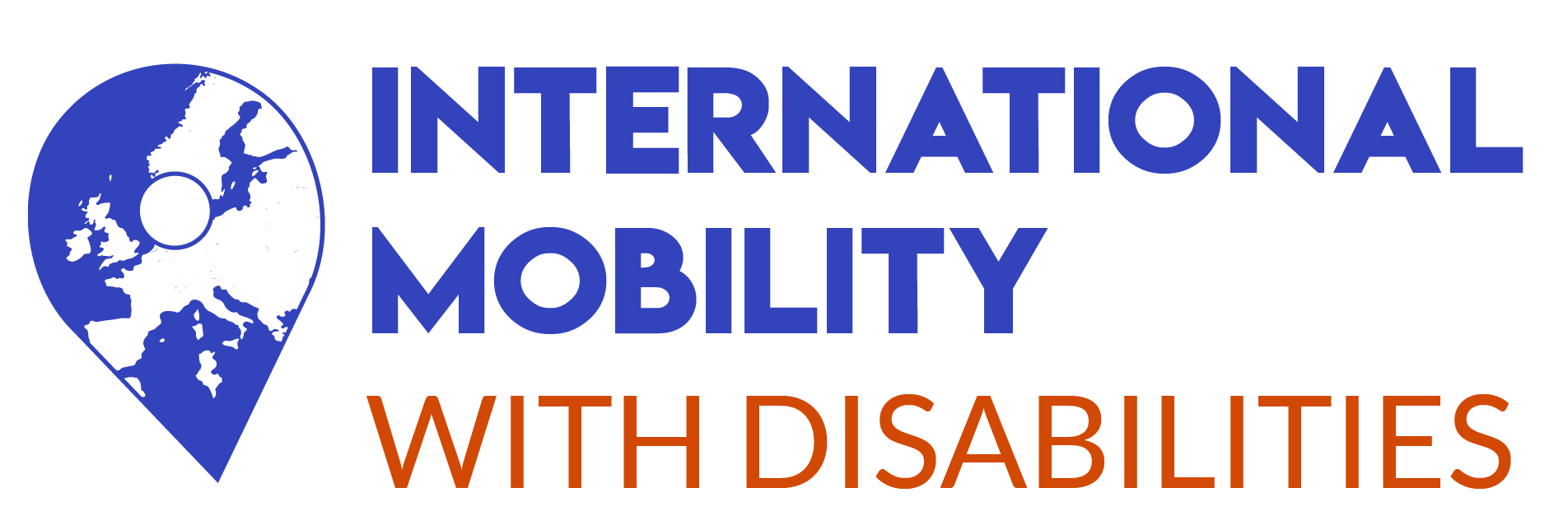
Youth with disabilities

INFORM YOURSELF
1. International Mobility Programs
a. All audiences
European Solidarity Corps
It is possible to achieve a European volunteering with the European Solidarity Corps program. This program allows young people (18-30 years old) to volunteer or work on projects organized in their country or abroad. These are projects aiming at helping some populations (prevention of natural disasters, reconstruction work, help in centers for asylum-seekers or social assistance, etc.). The projects last two to twelve months in the European Union (https://europa.eu/youth/solidarity_en)

International volunteer workcamps
International workcamps are volunteer activities carried out in Europe and all over the world. Missions in which volunteers participate are generally overseen by NGOs or local associations. This is a volunteering action. The projects are various and last a few weeks.
This typically involves helping local populations concerning infrastructures or social services. In theory, everyone can participate, irrespective of his or her academic/training background, but a minimum age of 16/18 years is required depending on the structures.
There is not yet European information about international volunteer workcamps. Every country deals with it on its own way. To know more about your country, you can contact referring structure on international mobility on the following map (in construction).
Language Assistantship
This means practicing your linguistic skills in a foreign country. The objective is both to teach a language you manage to speak while learning a language and culture that is foreign to you. This program can be very interesting if you want to become a teacher or if you want to develop your linguistic skills.
There is not yet European information about language assistantship programmes. Every country deals with it on its own way. To know more about your country, you can contact referring structure on international mobility on the following map (in construction).
Wwoofing
The Wwoofing (« World-Wide Opportunities on Organic Farms ») travel concept is economical, supportive and environmentally friendly. It consists of giving your time by participating in different tasks on an organic farm (garden, vegetable garden, orchard, flowers, livestock farming). The workload is about 25 hours a week, in exchange you are fed, hosted and immersed in a family with the local lifestyle. The network currently includes more than 12,000 farms in over 60 countries. You must be at least 18 years old
Workaway
Workaway is a global network connecting travelers willing to help out with hosts who need help with their projects or activities. The hosts may be a single person, families or groups. Workaway volunteers receive board and lodging in return for their help. This is a good way to discover a culture and a different country while developing his or her skills and adaptability. Be careful, you must pay to be put in contact with hosts.
Au pair stay
The au pair stay is a cultural and linguistic travel that aims at learning a language and discovering a culture. In exchange for your work, you are welcomed and lodged by a host family. It can be babysitting, help for work, household tasks, cooking, etc.
The terms of stay are defined beforehand with the family. There is not yet European information about au pair stay. Every country deals with it on its own way. To know more about your country, you can contact referring structure on international mobility on the following map (in construction).

b. Leave for studies
Students
The Erasmus program allows students to leave for Europe for one semester or the entire school year in a higher education institution. This allows you to progress in a foreign language and open up to interculturality
https://ec.europa.eu/programmes/erasmus-plus/opportunities/individuals/students/studying-abroad_en
Apprentices
If you are an apprentice you can leave with the Erasmus program. It allows to go to a country within the European Union to follow your training in a professional training organization. Mobility is supervised by your training institution and validated as part of your curriculum. Mobility can last between two weeks and twelve months.
Internships
If you want to do an internship abroad, it is quite possible to leave with the Erasmus + program. This allows you to do an internship in a company or in an organization inside the European Union. That internship can last between two and twelve months. This internship must be part of your training course and will be recognized as a part of your academic career.
https://ec.europa.eu/programmes/erasmus-plus/opportunities/trainees_en
For middle and high school students
It is possible to leave with Erasmus + during middle or high school. Indeed, there are student exchange programs or partnerships between organizations. Language teachers or school directors arrange this. You must therefore inquire with them.

c. After the studies
Young workers
If you are a young worker, you can do an internship abroad with the Erasmus + program. This one will allow you to enrich your professional experience after your studies. The internship abroad will allow you to acquire linguistic skills, adaptability and knowledge on the European market. You can also go to work abroad. The “EURES” website helps you find work opportunities within Europe.
https://ec.europa.eu/eures/eures-apps/opp/page/main?lang=en&app=2.3.1p2-build-0
Young entrepreneurs
The “Erasmus for young contractors” program is a transnational exchange program that offers to young people and to the future entrepreneurs the opportunity to learn from foreign entrepreneurs with some experience. This exchange of experiences allows new entrepreneurs to acquire, in contact with an experimented entrepreneur, the essential skills for the proper management of a small business.
https://www.erasmus-entrepreneurs.eu/index.php?lan=en
2. European legislation
Whatever the type of trip undertaken, it is important to have at hand the various texts relating to the recognition and protection of people with disabilities.
Non-discrimination and the right to autonomy:
Article 10 of the Treaty on the Functioning of the European Union adopted on 25 March 1957 lays the first groundwork on the rejection of all discrimination in the Union.
Article 26 of the Charter of Fundamental Rights of the European Union recognizes the right of people with disabilities to ensure their independence, social and occupational integration and participation in the life of the community.
The Convention on the Rights of Persons with Disabilities, signed by the European Union, recognizes the rights of persons with disabilities to liberty of movement (Article 18), encourages the use of all material assistance and support for mobility (Article 20) of the persons concerned in their autonomy, and ensures that persons with disabilities have access to general tertiary education, vocational training, adult education and lifelong learning, with adaptations where necessary (Article 24.5).
Disability rights legislation

Air transport Regulation (EC) n ° 1107/2006 on the rights of persons with reduced mobility during air travel: it provides for the prohibition of air carriers from refusing the reservation or boarding of passengers because of their disability or of their reduced mobility. It also guarantees the provision of free assistance on all airport platforms.
Boat Regulation (EU) n ° 1177/2010 on the rights of passengers traveling by sea or inland waterway: it provides for a right to information and compensation in the event of delay or cancellation. Since 2012, passengers with disabilities or reduced mobility can claim free assistance, both in port terminals and on board ships, as well as financial compensation in case of loss or damage to their mobility equipment.
Bus Regulation (EU) n ° 181/2011 on the rights of bus and coach passengers: it provides to all audiences, including people with disabilities or reduced mobility, a right to information and compensation in case of delay or cancellation. It also introduces compulsory free assistance services for companies.
Train Regulation (EU) n ° 1371/2007 on the rights of rail passengers: it specifies for people with disabilities that they have non-discriminatory access to all reservations without additional cost, to information on the accessibility of the rail service, to free assistance at the station and on board trains subject to reservation 48 hours in advance and to compensation for equipment damaged during the journey.
3. Financial assistance for the disabled
In order to better approach your mobility, it is important to ensure that your benefits and rights subscribed in your country of origin are well maintained throughout. Prior to your departure, contact your national contact structure to inform them of any changes of address.
For additional financial aid, in support of international mobility, you should also enquire in your country of origin. Similarly, once there, it is important to stay in touch with your embassy.
In some cases, it is possible to contact the embassies of the destination country. In the absence of financial aid, they may be able to provide information on administrative and practical procedures.
Beyond national aid, there may be additional regional aid or that from your town hall for international mobility.
You can contact the contact organizations on the map (in construction) to ask them for information on existing financial aid in their country. Please note that financial aid in destination countries is not always open to foreigners.

Aid for international mobility
When you undertake international mobility with a benchmark institution such as a university or school, the International Relations department of your institution supports you in all stages of your mobility and manages the teaching contract or internship agreement. In connection with the university’s disability adviser, they can provide you with information on the additional aid to which you are entitled as a person with a disability.
For young students with disabilities, additional support is available within the framework of an Erasmus + mobility and is also to be formulated at your home institution. The request may cover the estimated additional costs (all fields taken together) and must be the subject of supporting documents and much anticipation.
As for financial aid linked to disability, there are national, regional and local aid for international mobility. Check with the relevant authorities for more information.
